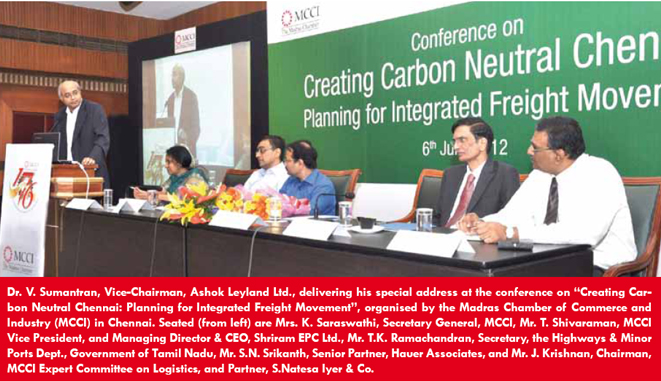 The future of road transport in India is stable with growing urbanisation all over the country. However, there is need for multi-mode connectivity for which more and more collaborative measures are required mainly to reduce the CO2 footprint. The emphasis should also be on the role of IT development to facilitate freight movement.
The future of road transport in India is stable with growing urbanisation all over the country. However, there is need for multi-mode connectivity for which more and more collaborative measures are required mainly to reduce the CO2 footprint. The emphasis should also be on the role of IT development to facilitate freight movement.
Delivering the special address at the conference on “Creating Carbon Neutral Chennai: Planning for Integrated Freight Movement”, organised by the Madras Chamber of Commerce and Industry (MCCI) in Chennai, Dr. V. Sumantran, Vice-Chairman, Ashok Leyland Ltd., said the idling and clogging of trucks caused a lot of CO2 emission which can of course be tackled through various practical measures. In this regard, the three stakeholders, namely, the citizen, the Government and industry should work together in solving the various problems arising out of heavy freight movement.
Referring to Chennai, known as the Detroit of India, he said that, with its educated population, good logistics and a strong industrial base, the city remains a major attraction where Ashok Leyland would continue investing. Very recently, the Tamil Nadu Government announced four large projects, including two for commercial vehicles, near the city.
Mr. T.K. Ramachandran, Secretary, the Highways & Minor Ports Dept., Government of Tamil Nadu, in his inaugural address, said that an integrated road transport policy is essential for overall development. At the same time, there is need for remaining carbon neutral. This is all the more necessary for a city like Chennai where there is heavy freight movement by road.
The State Government’s Vision Policy 2023 envisages an extensive 2,000 km of six or eight lanes, 3,000 km of four lanes and 4,000 km of two lanes within the next 10 years. Simultaneous development of ring roads would considerably ease traffic and freight movement. Even though trucks plying on roads are facing many problems including traffic congestion, the State is quite successful in handling the situation, he added.
Earlier, Mr. T. Shivaraman, MCCI Vice President, and Managing Director & CEO, Shriram EPC Ltd., in his welcome address, said what prompted the Chamber to organise the conference were its 175-year experience as a trade body and its pragmatic approach to major issues of importance.
Mr. S.N. Srikanth, Senior Partner, Hauer Associates, in his theme address, said India has the third largest road network in the world covering 3.3 million km and national highways covering 70,934 km. The rapid economic growth has put much pressure on road network development. Since 57 per cent of freight movement in the country is by road, there is an urgent need to divert a portion of it to rail and sea routes.
At the technical session that followed, the speakers highlighted the need for a co-ordinated approach to freight movement by road, rail and sea.